#this one took me so long to finish
Explore tagged Tumblr posts
Text

mwah
#my art#jujutsu kaisen#jjk#jjk fanart#jujutsu kaisen fanart#itafushi#fushiita#yuji itadori#fushiguro megumi#hiiiiiii sorry long time no draws i finally finished megumi's birthday piece and it knocked me OUT#so here is a recovery itfs smooch page. as a treat#itd been so long since id drawn yuuji at this point hdgsdd#gojo piece into 2 back to back megumi pieces that took probably a collective 2.5 weeks#crazy how fast the rust sets in with this kid#i think hes ok tho !!! it's always hard when one of them is standing in front of the other and blocking the Key Piece Of Hair#the one i lean on to carry the silhouette recognizability.....sighs#such is the peril of drawing smooch#anyway its always itfs friday in my heart so pls enjoy#this is brought to you by Thumb On Mouth#sequel to Hand On Thigh
4K notes
·
View notes
Text





[insert poetic title here]
fun fact: this did not start out as isat fanart
(rambling in tags)
#I was actually doing some personal writing and when I read it over a few days later I could only hear it in loops voice#speaking of which#i totally recommend watching ShortOneGaming's playthrough of the game#their voices for the characters match so well in my mind i can't separate them XD#also i have no clue why but this took FOREVER#I had the thumbnailing and paneling done so quickly but my motivation to finish it just left me midway through the third page T-T#Even though this is one of the shorter comics I've made (AND NO COLOUR) it somehow took my like twice as long -3-#loop is so fun to draw!#well actually fun to colour would be more accurate lol#also did you know that a keyknife was an actual thing??#I wanted to check if their was an a visual asset of it in the game only to find out they're just everyday objects you can own???#maybe im just seriously out of the loop lol#and i know the buttons are wrong but i was already mostly finished inking by the time i realized so lets just say its a stylistic choice#isat fanart#isat spoilers#sasasaap spoilers#two hats spoilers#cw body horror#??? i think#comic#artists on tumblr#fanart#digital illustration#digital art#isat#isat siffrin#isat loop#in stars and time spoilers#my art#my comic
3K notes
·
View notes
Text
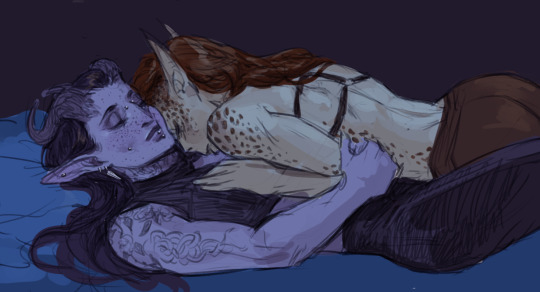


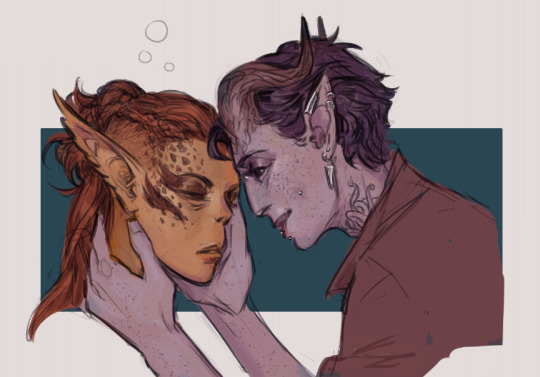
sleepy space alien NO MATCH for the faerunian “snuggle”
#lae'zel#nox#bg3#my art#my ocs#so many comic ideas but all i can focus on drawing is comfy cozy#im always like comics are so much work and take so long but I could’ve finished one in the time it took me to do all this 😑
5K notes
·
View notes
Text

jinx!
#my art#arcane#this show ruined me.....#and this piece too it took so long to finish#one of the sources of art block :')
2K notes
·
View notes
Text
"All those empty rooms
We could have been anywhere, anywhere else
Instead, I made a bed with apathy
My heart knew the weight
Ten years worth of dust and neglect
We made our peace with weariness and let it be..."
(Song: The Moon will Sing by the Crane Wives)
#scum villains self saving system#svsss#shen jiu#yue qingyuan#qijiu#hello children daddys come back from getting milk#I bring you dinner!! yaha!!!!#ai it took so long to make this because I kept not working on it aha... procrastinating yknow#but it's finished wow!!! please praise me woof woof#anyways this audio has completely run its course qwq so idk if this will annoy some people but#you cannot deny that a great deal of this song is quite in tune with them....#ahh... I love them so much... I still have another animation planned for them hahahaha!!!#BUT next up I am working on a tianlang jun animation so yall must wait for more qijiu snackies a little longer hehe#I'm excited to make tianyan!! xilang? sutian? xitian...? I still don't know what their name is.... tianxi? tiansu?#hehehehehehe Anyways thanks for sticking around!! hope this one will please yall!!!
2K notes
·
View notes
Text

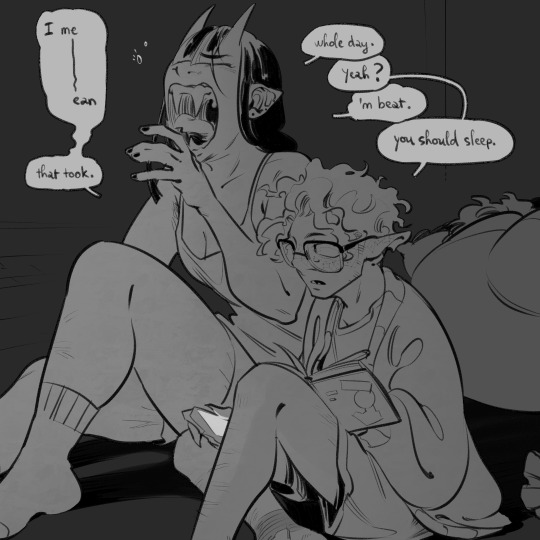
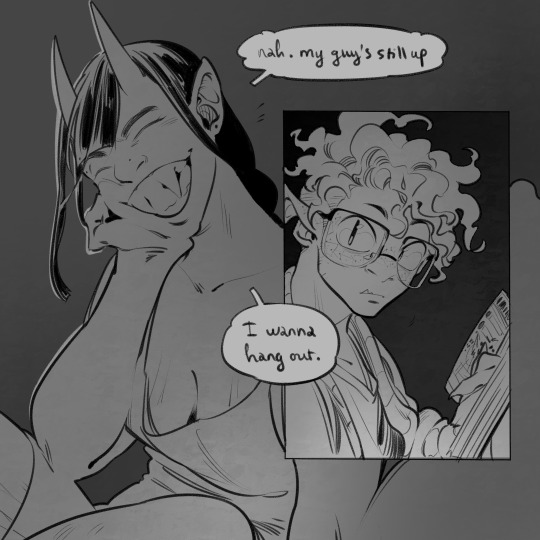
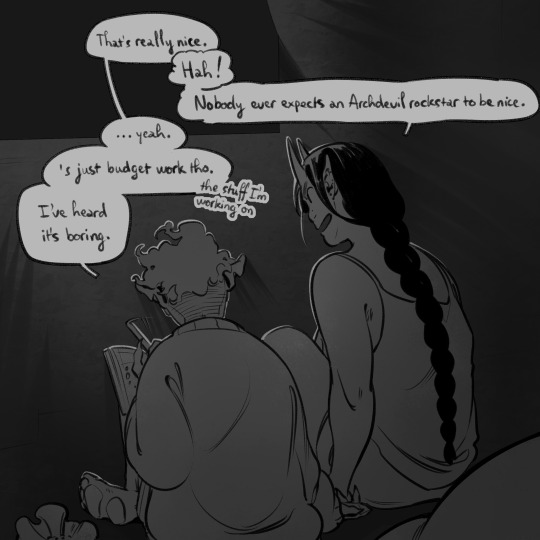
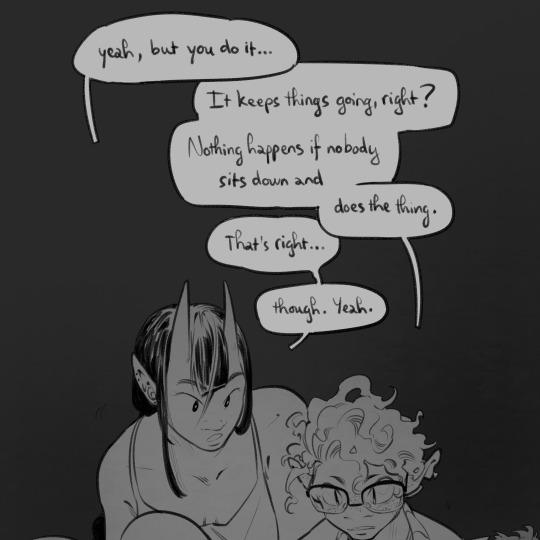


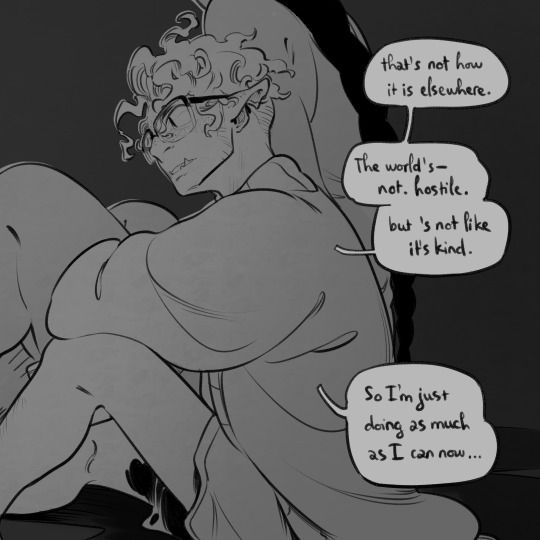
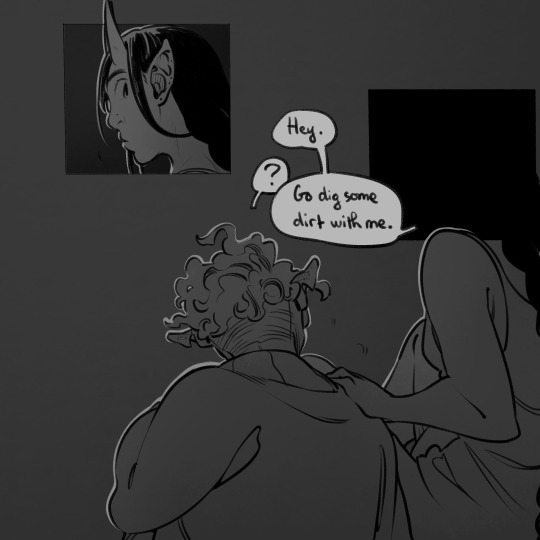

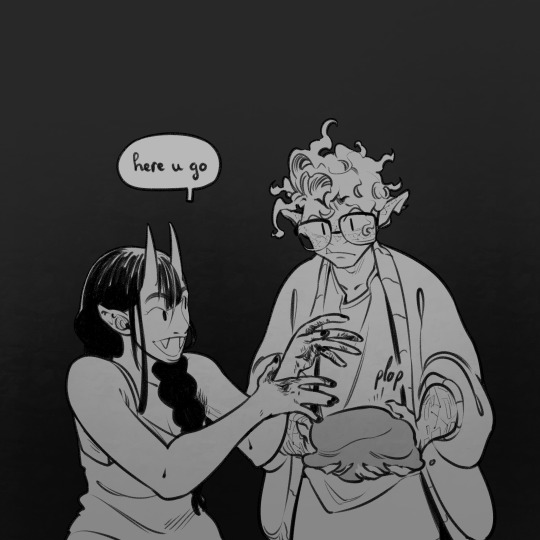
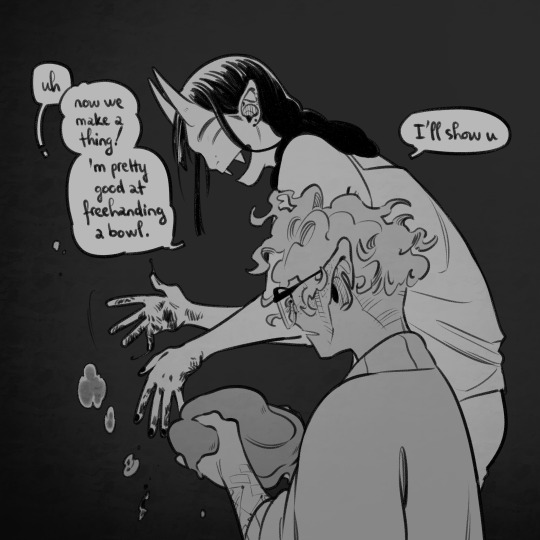
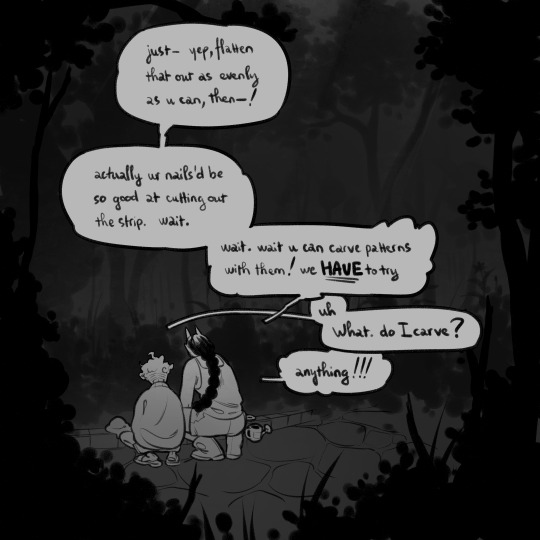

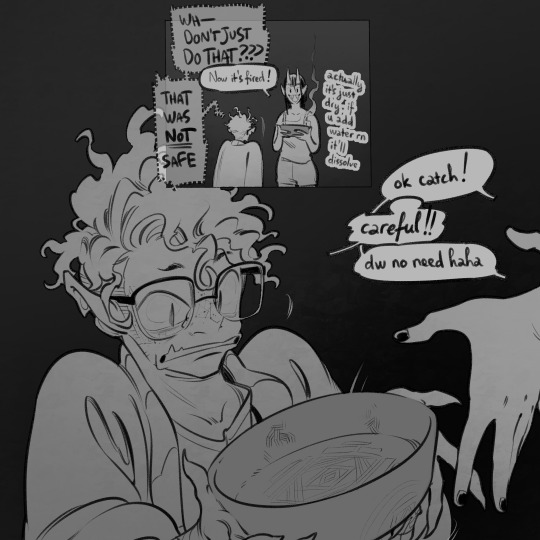


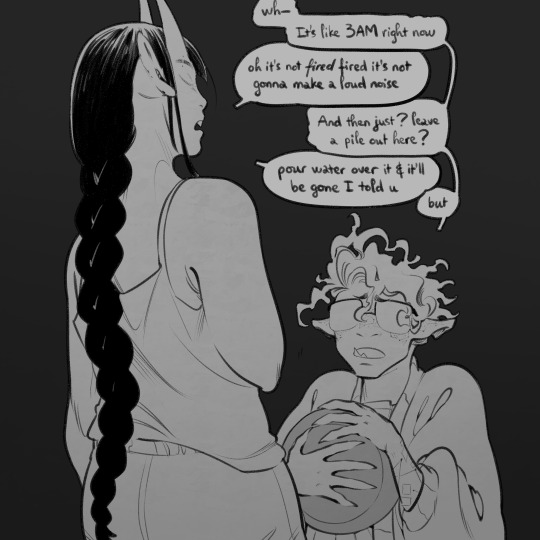

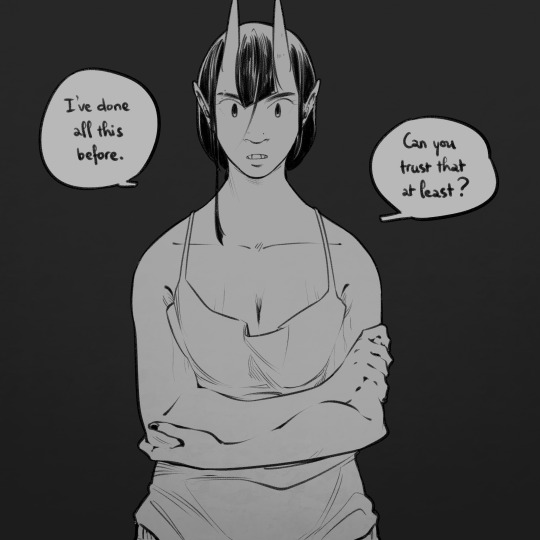
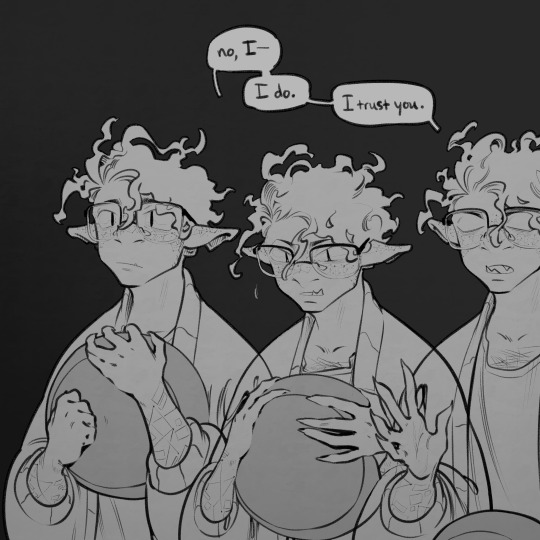
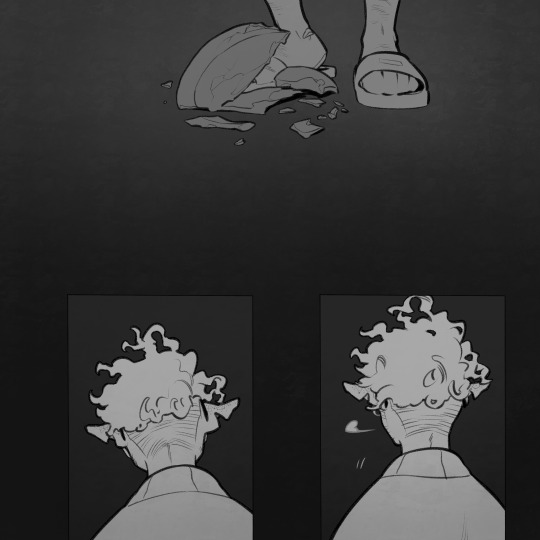
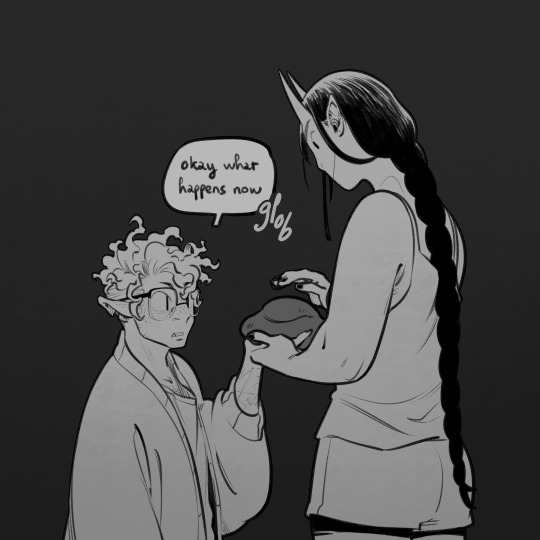
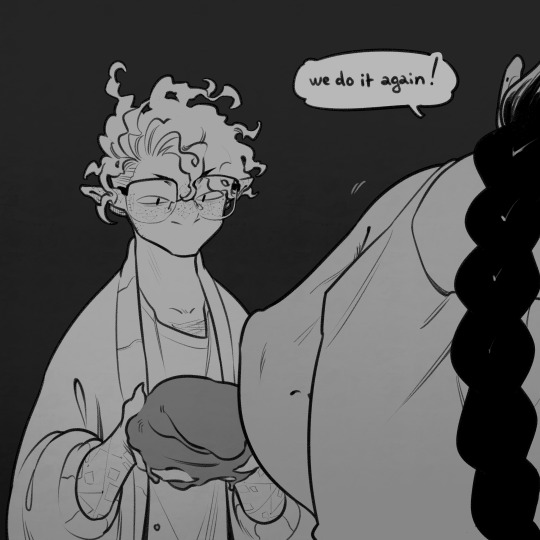
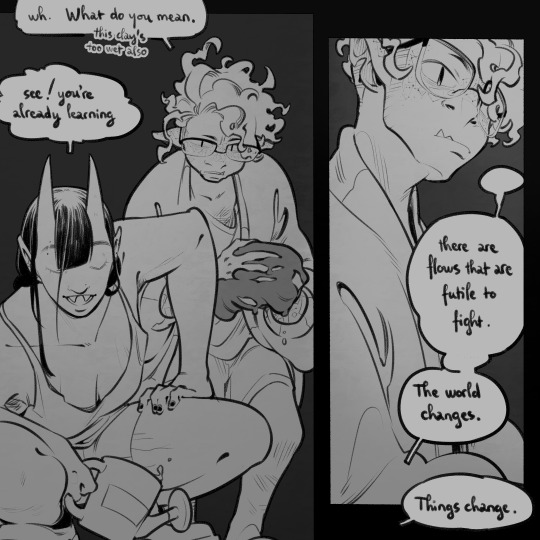
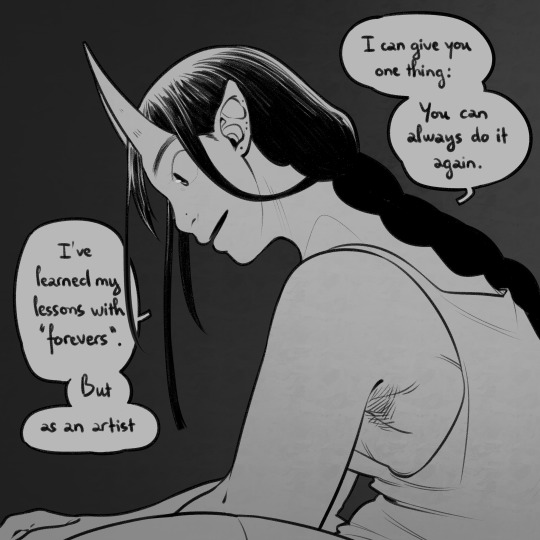
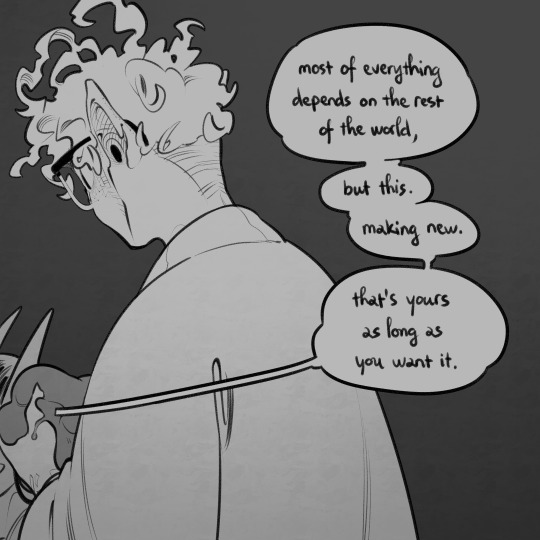
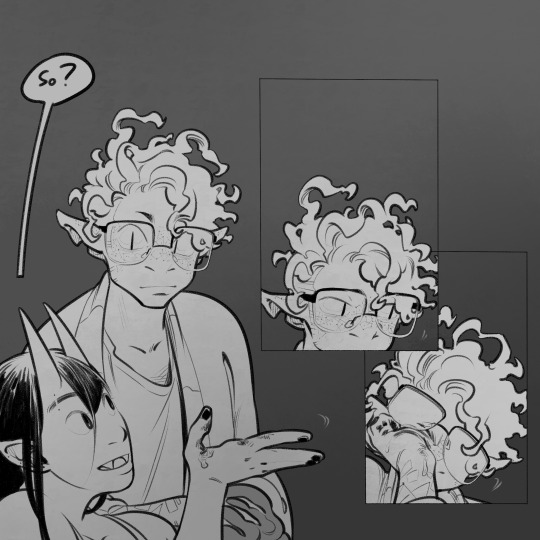
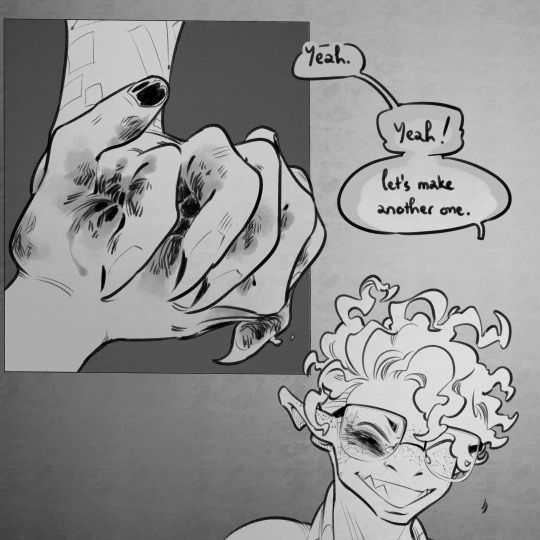
soon it'll be dawn again
transcript under the cut ⏬
page 01
Fig: no way? - you're still up?
Riz: Wh– yes?
Riz: Why'd I not be.
page 02
Fig: I me~~ean - that took.
Fig: whole day.
Riz: Yeah?
Fig: 'm beat.
Riz: you should sleep.
page 03
Fig: nah. my guy's still up
Fig: I wanna hang out.
page 04
Riz: That's really nice.
Fig: Hah! - Nobody ever expects an Archdevil rockstar to be nice.
Riz: … yeah. - 's just budget work tho. (the stuff I'm working on) - I've heard it's boring.
page 05
Fig: yeah, but you do it…
Riz: It keeps things going, right? - Nothing happens if nobody sits down and - does the thing.
Fig: That's right… - though. Yeah.
page 06
Fig: sometimes it's someone else who - doesn't want the same thing to happen.
Riz: … - mm.
page 07
Riz (off screen): …It took me a long time to get that not everyone likes doing what I do. - 's probably because you guys are so nice– - or. - kind.
Riz (off screen): to anyone too, not just. - the people you /love/.
page 08
Riz: that's not how it is elsewhere. - The world's– not. hostile. - but 's not like it's kind.
Riz: So I'm doing as much as I can now…
page 09
Fig: Hey.
Riz: ?
Fig: Go dig some dirt with me.
page 10
Riz: [blank speech bubble] - oh you meant like - actual dirt. (not incriminating information)
Fig: o yea.
Fig: there's clay in the backyard soil. - sometimes when I'm sun deficient or something I go touch dirt for a bit.
page 11
Fig: here u go
page 12
Riz: uh
Fig: now we make a thing! - 'm pretty good at freehanding a bowl.
Fig: I'll show u
page 13
Fig: just– yep, flatten that out as evenly as u can, then–! - actually ur nails'd be so good at cutting out the strip. [larger than usual space] wait. - wait. wait u can carve patterns with them! we HAVE to try
Riz: uh - What. do I carve?
Fig: anything!!!
page 14
Fig: and– yep just seal the inside uh. seam?
Fig: yep that works - okay time's up! all contestant hands up
Riz: [blank speech bubble] - okay - wh. what's next?
Fig: haha - watch this.
(sound effect text): FWOO—MP
page 15
Riz: WH– DON'T JUST DO THAT???
Fig: Now it's fired!
Riz: THAT WAS NOT SAFE
Fig: (actually it's just dry. if u add water rn it'll dissolve)
Fig: ok catch!
Riz: [blank speech bubble] - careful!!
Fig: dw no need haha
page 16
Riz (thought bubble): oh - it's warm…
Fig: now I want you to throw this.
page 17
Fig: u gotta do it - c'mon
page 18
Riz: wh– - It's like 3AM right now
Fig: oh it's not /fired/ fired it's not gonna make a loud noise
Riz: And then just? leave a pile out here?
Fig: pour water over it & it'll be gone I told u
Riz: but
page 19
Fig (off screen): RIz.
page 20
Fig: I've done all this before.
Fig: Can you trust that at least?
page 21
Riz: no, I– - I do. - I trust you.
page 23
Riz: okay what happens now
(sound effect text): glob
page 24
Fig: we do it again!
page 25
Riz: wh. [larger than usual space] What do you mean. (this clay's too wet also)
Fig: see! you're already learning
Fig: [blank speech bubble] - there are flows that are futile to fight. - The world changes.
Fig: Things change.
page 26
Fig: I've learned my lessons with "forevers". - But - as an artist
Fig: I can give you one thing: - You can always do it again.
page 27
Fig: most of everything depends on the rest of the world, - but this. - making new. - that's yours as long as you want it.
page 28
Fig: So?
page 29
Riz: Yeah. - Yeah! - let's make another one.
#dimension 20#fantasy high junior year#fhjy#riz gukgak#figueroth faeth#technically no spoilers in this comic but listen. I Will be gloating in tags. I will Never Shut Up#for the record!! this was fully conceptualized and sketched Before the finales. I started sketching this after the boat fight#and when murph closed riz's arc this season with ''maybe it's okay to change and welcome new things'' I pogged irl#I am simply the best at reading comprehension what can I say! (<- grown ass man with roughly the same perspective on teenhood as the player#fucked up that this became so long (almost 30 squares lol) that it took me this long to finish#lmao I say all that but. genuinely I am delirious and my feelings abt riz's arc this season are so big... I was getting psychic backlash#for a While lol. it was scary!!#had to sit down and do therapy on my own ass for a bit. the teenage apocalyticisation is real. that word isnt tho Im pretty sure#truly anything you do at that age feels like that's it that's all you've got going on forever. and its not true! its simply not true#you'll be okay my guy. you love your friends so so much but also there will be more to love out there#this one goes out to fellow aroaces and also folks leaving somewhere theyve called home for a long time#nothing lasts forever but that means new things come by too! ur ability to make new is infinite!!#there's no magnum opus people leave but new people come by too etc. I am too sleepy to remember what I wanted to say uhhh#well. thank u for looking at my art. I think thats the one pack it n ship it boys
2K notes
·
View notes
Text

LOA Shiptober Day 4: How They Met
October content month was ambitious..
This one took me. Shockingly long. Whoops! I’ll probably end up jumping around the prompt list and it might extend into November 😋
I’ll try to do day 31 on the actual date of Halloween though 🫡
#the good or bad thing depending on who you ask about my ship art is that there are many more ranting tags#once again bringing my “he can’t blush but what if he did’’ agenda#Ngl the first panel reminds me of a children’s book it’s kind of fire#I feel like frost doesn’t like being touched by most people#but then he meets gricko professional animal friend and he’s so confused bc wtf why doesn’t he hate this#so that’s the drawing#sighs fondly confused grimmorning#except frost is the only one that’s confused#Im not joking when I say this one took me a long time I started it the day before the prompt and finished it like a week later#unintentional but frost is doing the Jim halpert thing#he wasn’t supposed to be but it turned out that way#frost don’t Jim the fourth wall.. community reference yeah..#I keep forgetting gricko tail agenda#also I love all the requests I’ve been getting once shiptober is over those will be popping up#anyways that’s enough out of me#but seriously some of those requests are so good they’re actually inspiring me to finish these pieces#legends of avantris#once upon a witchlight#morning frost#gricko grimgrin#grimmorning#gricko x frost#OH last thing possible stardust rhapsody art on the way I have to share my dandy art with the world
768 notes
·
View notes
Text
Going feral for this movie

My submission for the fanart contest for the movie @characterhub-com #TeamOptimus!
#transformers#transformers one#optimus prime#megatron#elita one#bumblebee#this took so long haha#i never do finish pieces so this took so much outta me#but was so satisfying to finish
532 notes
·
View notes
Text




all the twitch assets I drew for mike 😊
#artists on tumblr#art#mikethelink#tazercraft#digital art#my art#fanart#mike#vile arts#brart#brazilian artists#brartist#mcyt#took me so long to post this lol it's been months since I finished these#the animated emotes r a little glitchy cuz they all have different amounts of frames#only the ones with exactly 60 frames loop perfectly#also the bottom 3 animated emotes ????? they're cheermotes that he commissioned and never put in his channel#I think he just forgot ngl
406 notes
·
View notes
Text
i lied i had like atleast one more weston thought to expell from my brain, before i miss this boat entirely. we're heading to green lands woooo
#god i had a fever this entire morning and afternoon so I think it was my inability to do anything that finally pushed me to finish this#seriously it took a month... disapointing#more disappointing is that i didn't have the time to tear up the internet in order to find what a professors break room looked like in 1899#if there was such a thing#really tragic#ah yea welp im very glad it's out there atleast. I want to release all of my black butler stuff so badly but guh...#tragedy has struck and i have been inspired to finally make a person project of my own#so that's taking a long time#but not to worry after like 5 years and some pondering i know well that black butler will always be one half of my brain#coooool#anyway i got more dorky stuff coming I hope??? wasn't lying before I am thinking of the midfords#and ill pray i can find the strength to get everything done soon#hope my rants are more tasteful after months of absence if ur still here#kuroshitsuji#black butler#kuroshitsuji fanart#fanart#sebastian michaelis#digital art#animation#animatic#video#weston college arc#black butler anime#black butler agares
548 notes
·
View notes
Text





happy pride month beautiful people ‼️
#atla#zukka#zuko x sokka#zukka fanart#atla fanart#mailee#mai x ty lee#mailee fanart#toph fanart#aang fanart#azula and zuko#katara and suki are here in spirit they are both bisexual#anyways sorry this took me so long but my last exam finished today so I was suuuper eager to post :)#anyways for the aang one I was like: well he loves everyone so#smooch the camera#anyways happy prideeeeee I’m proud of you you’re valid you’re beautiful have a great day ahhhhh <3333
718 notes
·
View notes
Text
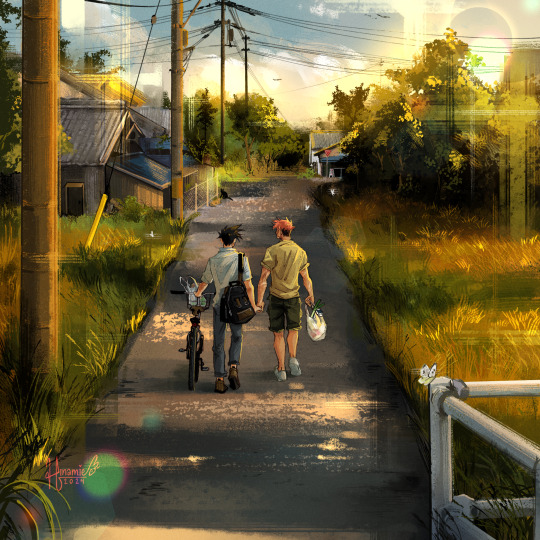


alongside someone like you
#my art#jujutsu kaisen#jjk#yuji itadori#megumi fushiguro#itafushi#fushiita#fanart#jjk fanart#jujutsu kaisen fanart#jjk spoilers#jjk manga spoilers#jjk 266#jjk leaks#i feel like i say this after every piece at this point but iam once again. SO TIRED#collapses dead#cries i did it again i ws up all last night finishing the first 1.....tht one took *counts* 8 hours...#got 3 hrs sleep n picked up where i left off on th second one at 8 in the morning#2nd one absolutely ruined me n made the third one feel like a herculean task . even tho its literally just them on a bed#rooms....KITCHENS......beloathed!!!! public enemy no1 kill on sight!!!!!!#hell is real and they make u render different rooms of houses from scratch no perspective tool no clue what ur doing#n they see how long it takes u to completely lose it#clipped yuujis bangs back tho n i thought tht was cute . silver linings#1ST ONE WAS SO FUN ALSO idk if its bc outdoor environments r forgiving or bc i had more energy n was fresh faced n hopeful or what#but it is by far my favourite. once again pulled out nearly every nature brush in my arsenal#third one meh simple safe soft w/e i was just so exhausted after th kitchen tht working on it was such a slog#oh ya i added a bunch of scars 2 yuuji's arms n lobbed off his ring finger sighs the yuuji injury list (tm) grows every minute#also HINA USE YELLOW CHALLENGE CLEAR golden hour in2 sunset my beloved <333 easy warm light + safe homey Peaceful vibes...bless#cries eternally thinking abt them let us have this let THEM have this pls thank u#ok i need to not look at these anymore take them enjoy my contribution 2 the domestic itfs pile
2K notes
·
View notes
Text

#portal 2#my art#chell portal#wheatley#she then got her hair stuck#based on this one spiderman and mary jane image that took me too long to find#do you know what i'm talking about#i really liked the sketch i did so i was excited to do the finished image but the process was painful#still not entirely happy with it if you see it change later no you didn't#“posting something portal later” doesn't post for 2 days#lesson learned don't listen to me#does wheatley look smug or annoyed cause i was going for smug but someone said he looked annoyed and thats not#he has hair#chell
627 notes
·
View notes
Text
Compilation of EVERY single time they changed Hobie's filter in the digital version:
Left: Theatrical release Right: Digital release



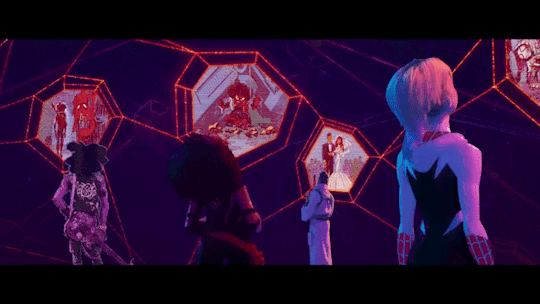

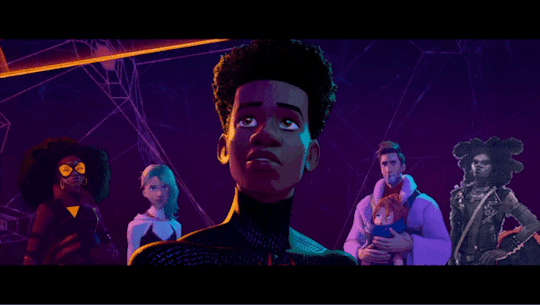
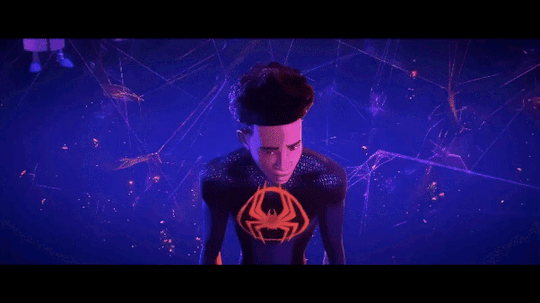
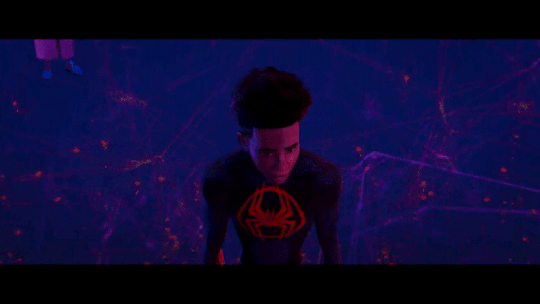
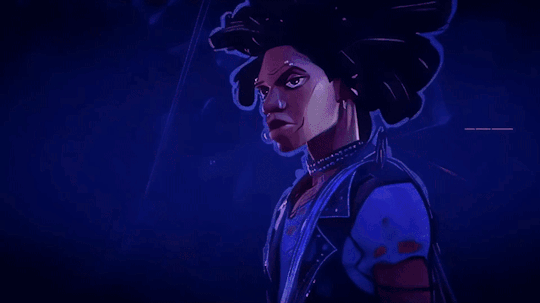
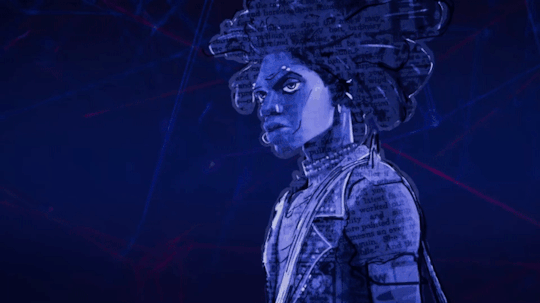

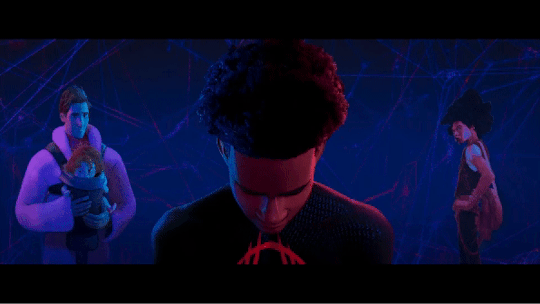
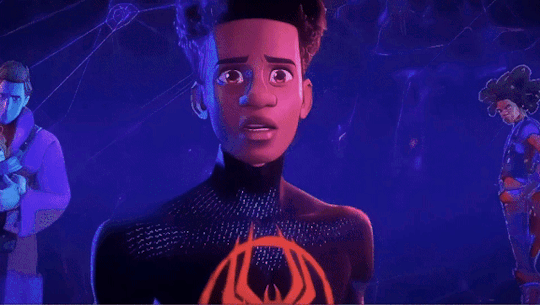
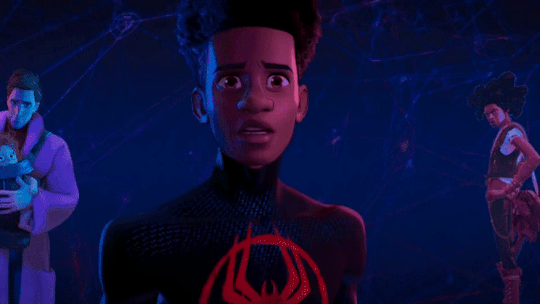

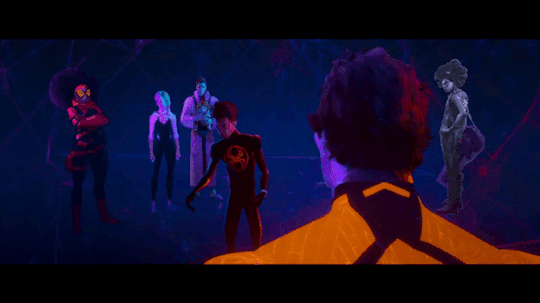

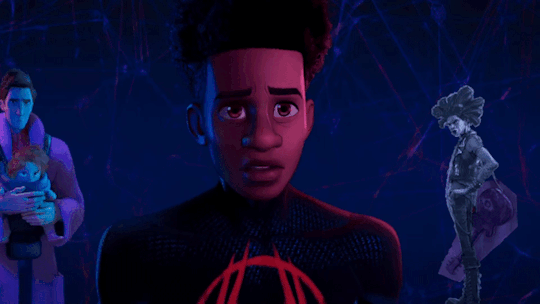
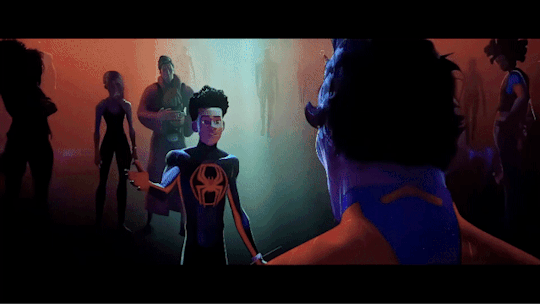
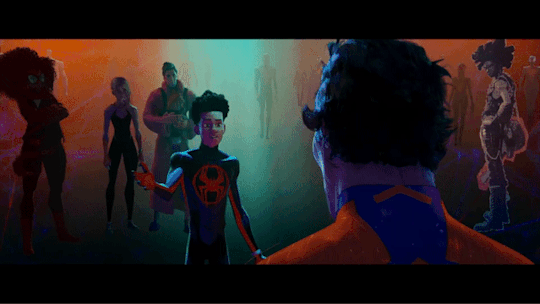
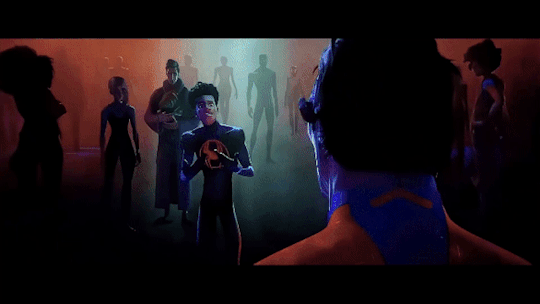
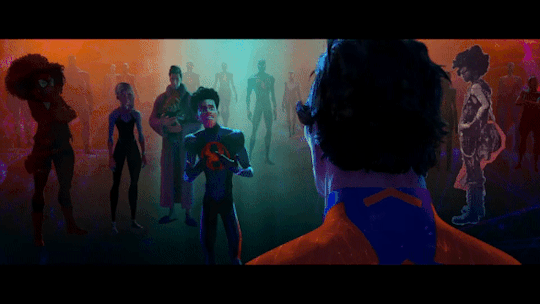

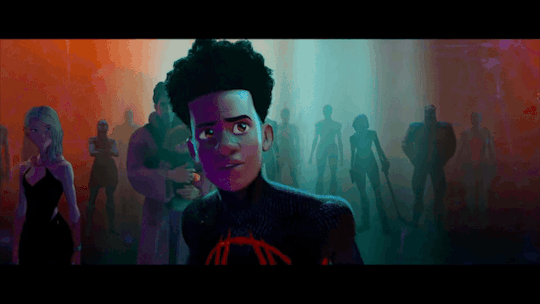
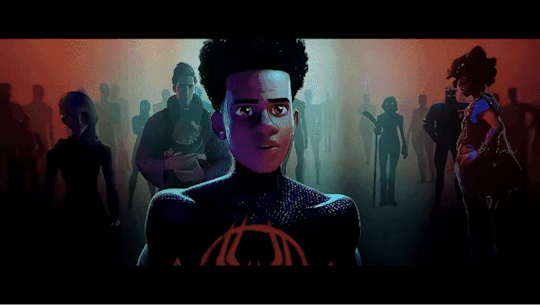
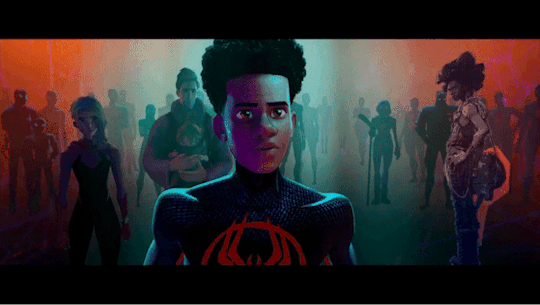
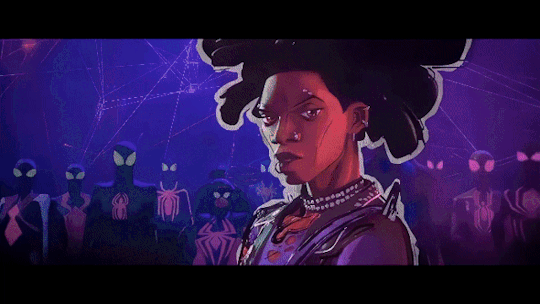
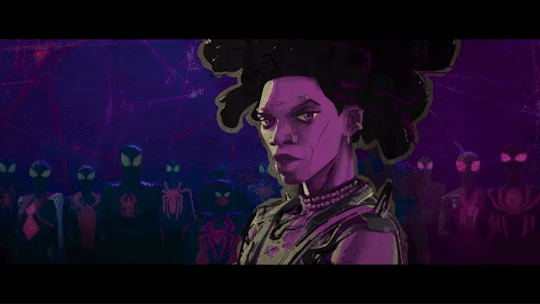


You might have to click on some of them to get a better look at Hobie, sadly I don't have a video editor that allows me to make better edits than these :')
#This took so long to make lol#cause I had to edit every scene with Hobie from both versions so I could watch them right after one another to compare them#I did this with ALL the scenes he's in also the ones where he's on screen as spider-punk#but they only changed his filters in these scenes so it was a waste of time :')#sidenote: no it wasn't it's never a waste of time to look at hobie I just couldn't use it for my GIFset lol#I also made a bouns one but I'm not allowed to post more than 30 GIFs in one post apparently so I guess I just won't add it then...#but Hobie was basically filterless during all these scenes in the theatrical version#I like that they gave him more different filters in the digital version#the only change I don't like is in the first GIFs#cause like that one post pointed out it looks like they removed his lipstick for some reason#also really wish I had a better video editor so we could get a closer look at Hobie but I did my best with what I had#also slowed some of them down to get a better look at them#been having this idea for a while and now I finally finished it!#which means I can go back to working on my fics now#hopefully lol#also lemme know if there are some other scens you guys want me to make comparisons of#cause I have both versions#the theatrical release isn't the highest quality though so if you know where I can get my hands on a better version lemme know ;)#hobie brown#spider punk#miles morales#spider man#peter b parker#jess drew#miguel o'hara#spider man across the spider verse#across the spider verse#across the spiderverse#atsv#theatrical version
1K notes
·
View notes
Text
patience being tested. being forced by a bizarre unfortunate situation to adhere to university requirement technicality by taking this simple basic elementary "introduction to environmental history" class.
this class is from facilitators/program which do, like, "history of the American frontier" or "history of fishing and hunting" and still basically subscribe to that old-school twentieth-century idealization and celebration of characters like Teddy Roosevelt and reverence for a mythical arc-of-history-bent-towards-justice narrative of the often-clumsy but ultimately-benevolent US federal government and its mission to "save nature" through the miracle of "sustained yield," while heroic federal land management agencies and "heritage" institutions lead to way, staffed by exceptional individuals (appeals to nostalgia for the frontier and an imagined landscape of the American West; ego-stroking appeals to flattering self-image that center the environmentalist or academic). where they invoke, y'know, ideas like "ecology is important because don't you enjoy cross-country skiing in The Woods with your niece and nephew? don't you like hunting and fishing?" which makes it feel like a time capsule of appeals and discourses from the 1970s. and it invokes concept of "untouched wilderness" (while eliding scale of historical Indigenous environmental relationships and current ongoing colonial violence/extractivism). but just ever-so-slightly updated with a little bit of chic twenty-first-century flair like a superficial land acknowledgement or a reference to "labor histories" or "history from below," which is extra aggravating when the old ideologies/institutions are still in power but they're muddying the water and diluting the language/frameworks (it's been strange, watching words like "multispecies" and "Anthropocene" over the years slowly but surely show-up on the posters, fliers, course descriptions, by now even appearing adjacent to the agri-business and resource extraction feeder programs, like a recuperation or appropriation.) even from a humanities angle, it's still, they're talking at me like "You probably didn't know this, but environmental history is actually pretty entangled with political and social events. In fact, we can synthesize sources and glean environmental info from wacky places like workers' rolls in factories, ship's logs, and poetry from the era." and i'm nodding like YEP.
the first homework assignment is respond to this: "Define and describe 'the Anthropocene'. Do you think 'the Anthropocene' is a useful concept? Why or why not?" Respond in 300 words.
so for fun, right now in class, going to see how fast i can pull up discussion of Anthropocene-as-concept solely from my old posts on this microblogging site.
---
ok, found some
---
I think that the danger in any universal narrative or epoch or principle is exactly that it can itself become a colonizing force. [...] I’m suspicious of the Anthropocene as concept for the very reason that it subsumes so many peoples, nations, histories, geographies, political orders. For that reason, I think ideas like the Anthropocene can be a useful short-hand for a cluster of tangible things going on with the Earth at the moment, but we have to be very careful about how fluid and dynamic ideas become concretized into hegemonic principles in the hands of researchers, policymakers, and politicians. There’s so much diversity in histories and experiences and environmental realities even between relatively linked geographies here in Canada [...]. Imagine what happens when we try to do that on a global scale - and a lot of euro-western Anthropocene, climate change and resilience research risks doing that - eliding local specificities and appropriating knowledge to serve a broader euro-western narrative without attending to the inherent colonial and imperial realities of science and policy processes, or even attending to the ways that colonial capitalist expansion has created these environmental crises to begin with. While we, as a collective humanity, are struggling with the realities of the Anthropocene, it is dangerous to erase the specific histories, power-relations, political orders that created the crisis to begin with. So, I’m glad that a robust critique of the Anthropocene as a concept is emerging.
Text by: Words of Zoe Todd, as interviewed and transcribed by Caroline Picard. “The Future is Elastic (But it Depends): An Interview with Zoe Todd.” 23 August 2016.
---
---
---
The Great Acceleration is the latest in a series of human-driven planetary changes that constitute what a rising chorus of scientists, social scientists, and humanists have labeled the Anthropocene - a new Age of Humans. [...] But what the Anthropocene label masks, and what the litany of graphs documenting the Great Acceleration hide, is a history of racial oppression and violence, along with wealth inequality, that has built and sustained engines of economic growth and consumption over the last four centuries. [...] The plantation, Sidney Mintz long ago observed, was a “synthesis of field and factory,” an agro-industrial system of enterprise [...]. Plantation legacies, along with accompanying strategies of survival and resistance, dwell in the racialized geographies of the United States’ and Brazil’s prison systems. They surface in the inequitable toxic burdens experienced by impoverished communities of color in places like Cancer Alley, an industrial corridor of petrochemical plants running along the Mississippi River from New Orleans to Baton Rouge, where cotton was once king. And they appear in patterns of foreign direct investment and debt servitude that structure many land deals in the Caribbean, Brazil, and sub-Saharan Africa [...]. [C]limatologists and global change scientists from the University of London, propose instead 1610 as a date for the golden spike of the Anthropocene. The date marked a detectable global dip in carbon dioxide concentrations, precipitated, they argue, by the death of nearly 50 million indigenous human inhabitants [...]. The degradation of soils in the tobacco and cotton-growing regions in the American South, or in the sugarcane growing fields of many Caribbean islands, for example, was a consequence of an economic and social system that inflicted violence upon the land and the people enslaved to work it. Such violent histories are not so readily evident in genealogies that date the Anthropocene’s emergence to the Neolithic Revolution 12,000 years ago, the onset of Europe’s industrial revolution circa 1800, or the Trinity nuclear test of 1945. Sugarcane plantations were already prevalent throughout the Mediterranean basin during the late middle ages. But it was during the early modern era, and specifically in the Caribbean, where the intersection of emerging proto-capitalist economic models based on migratory forced labor (first indentured servitude, and later slavery), intensive land usage, globalized commerce, and colonial regimes sustained on the basis of relentless racialized violence, gave rise to the transformative models of plantations that reshaped the lives and livelihoods of human and non-human beings on a planetary scale. [...] We might, following the lead of science studies scholar Donna Haraway and anthropologist Anna Tsing, more aptly designate this era the Plantationocene. [...] It is also an invitation to see, in the words of geographer Laura Pulido, “the Anthropocene as a racial process,” one that has and will continue to produce “racially uneven vulnerability and death." [...] And how have such material transformations sustained global flows of knowledge and capital that continue to reproduce the plantation in enduring ways?
Text by: Sophie Sapp Moore, Monique Allewaert, Pablo F. Gomez, and Gregg Mitman. "Plantation Legacies." Edge Effects. 22 January 2019. Updated 15 May 2021. [Bold emphasis added by me.]
---
---
---
Geologists and other scientists will fight over [the definition of the beginning start-date of the Anthropocene] in scientific language, seeking traces of carbon dioxide that index the worst offenses of European empire which rent and violated the flesh, bodies, and governance structures of Indigenous and other sovereign peoples in the name of gold, lumber, trade, land, and power. [...] The stories we tell about the origins of the Anthropocene implicate how we understand the relations we have with our surrounds. In other words, the naming of the Anthropocene epoch and its start date have implications not just for how we understand the world, but this understanding will have material consequences, consequences that affect body and land.
Text by: Heather Davis and Zoe Todd. On the Importance of a Date, or Decolonizing the Anthropocene. ACME An International Journal for Critical Geographies. December 2017. [Bold emphasis added by me.]
---
---
---
From Aime and Suzanne Cesaire, C. L. R. James, Claudia Jones, Eduoard Glissant, through Sylvia Wynter, Christina Sharpe, and so many others, critical anticolonial and race theory has been written from the specific histories that marked the Black Atlantic. [...] Glissant also reminds us, secondly, of how cunning the absorptive powers of [...] liberal capitalism are - how quickly specific relations are remade as relations-erasing universal abstractions. [...] This absorptive, relations-erasing universalism is especially apparent in some contemporary discourses of […] liberalism and climate collapse - what some call the Anthropocene - especially those that anchor the crisis in a general Human calamity which, as Sylvia Wynter has noted, is merely the name of an overdetermined and specific [White] European man. […] [T]he condition of creating this new common European world was the destruction of a multitude of existing black and brown worlds. The tsunami of colonialism was not seen as affecting humanity, but [...] these specific people. They were specific - what happened to them may have been necessary, regrettable, intentional, accidental - but it is always them. It is only when these ancestral histories became present for some, for those who had long benefitted from the dispossession [...], that suddenly the problem is all of us, as human catastrophe.
Text by: Elizabeth Povinelli. “The Ancestral Present of Oceanic Illusions: Connected and Differentiated in Late Toxic Liberalism.” e-flux Journal Issue #112. October 2020.
---
The narrative arc [of White "liberal humanism"] [...] is often told as a kind of European coming-of-age story. […] The Anthropocene discourse follows the same coming-of-age [...] script, searching for a material origin story that would explain the newly identified trajectory of the Anthropos […]. Sylvia Wynter, W.E.B. DuBois, and Achille Mbembe all showed how that genealogy of [White subjecthood] was [...] articulated through sixteenth- through nineteenth-century [historiographies and discourses] in the context of colonialism, [...] as well as forming the material praxis of their rearrangement (through mining, ecological rearrangements and extractions, and forms of geologic displacements such as plantations, dams, fertilizers, crops, and introduction of “alien” animals). […] As Wynter (2000) commented, “The degradation of concrete humans, that was/is the price of empire, of the kind of [Eurocentric epistemology] that underlies it” (154).
Text by: Kathryn Yusoff. “The Inhumanities.” Annals of the American Association of Geographers, Volume 11, Issue 3. November 2020.
---
---
---
As Yarimar Bonilla suggests in regard to post-Irma-and-Maria Puerto Rico, “vulnerability is not simply a product of natural conditions; it is a political state and a colonial condition.” Many in the Caribbean therefore speak about the coloniality of disaster, and the unnaturalness of these “natural” disasters [...]. Others describe this temporality by shifting [...] toward an idea of the Plantationocene [...]. As Moore and her colleagues write, “Plantation worlds, both past and present, offer a powerful reminder that environmental problems cannot be decoupled from histories of colonialism, capitalism, and racism that have made some human beings more vulnerable [...].” [W]e see that contemporary uneven socioecologies associated with the rise of the industrial world ["the Anthropocene"] are based [...] also on the racialized denial and foreshortening of life for the sacrificial majority of black, brown, and Indigenous people and their relegation to the “sacrifice zones” of extractive industry. [...] [A]ny appropriate response to the contemporary climate emergency must first appreciate its foundations in the past history of the violent, coercive, transatlantic system of plantation slavery; in the present global uneven development, antiblackness, and border regimes that shape human vulnerability [...] that continues to influence who has access to resources, safety, and preferable ecologies [...] and who will be relegated to the “plantation archipelagoes” (as Sylvia Wynter called them) [...].
Text by: Mimi Sheller. “Thinking Beyond Coloniality: Toward Radical Caribbean Futures.” Small Axe (2021), 25 (2 (65)), pages 169-170. Published 1 July 2021. [Bold emphasis added by me.]
---
---
---
Indigenous genocide and removal from land and enslavement are prerequisites for power becoming operationalized in premodernity [...]; it was/is a means to operationalize extraction (therefore race should be considered as foundational rather than as periphery to the production of those structures and of global space). [...] Wynter suggests that we […] consider 1452 as the beginning of the New World, as African slaves are put to work on the first plantations on the Portuguese island of Madeira, initiating the “sugar-slave” complex - a massive replantation of ecologies and forced relocation of people […]. Wynter argues that the invention of the figure of Man in 1492 as the Portuguese [and Spanish] travel to the Americas instigates at the same time “a refiguring of humanness” in the idea of race. [...] The natal moment of the 1800 Industrial Revolution, […] [apparently] locates Anthropocene origination in […] the "new" metabolisms of technology and matter enabled by the combination of fossil fuels, new engines, and the world as market. […] The racialization of epistemologies of life and nonlife is important to note here […]. While [this industrialization in the nineteenth century] […] undoubtedly transformed the atmosphere with […] coal, the creation of another kind of weather had already established its salient forms in the mine and on the plantation. Paying attention to the prehistory of capital and its bodily labor, both within coal cultures and on plantations that literally put “sugar in the bowl” (as Nina Simone sings) […]. The new modes of material accumulation and production in the Industrial Revolution are relational to and dependent on their preproductive forms in slavery […]. In 1833, Parliament finally abolished slavery in the British Caribbean, and the taxpayer payout of £20 million in “compensation” [paid by the government to slave owners for their lost "property"] built the material, geophysical (railways, mines, factories), and imperial infrastructures of Britain and its colonial enterprises and empire. [...] A significant proportion of funds were invested in the railway system connecting London and Birmingham (home of cotton production and […] manufacturing for plantations), Cambridge and Oxford, and Wales and the Midlands (for coal). Insurance companies flourished [...]. The slave-sugar-coal nexus both substantially enriched Britain and made it possible for it to transition into a colonial industrialized power […]. The slave trade […] fashioned the economic conditions (and institutions, such as the insurance and finance industries) for industrialization.
Text by: Kathryn Yusoff. "White Utopia/Black Inferno: Life on a Geologic Spike". e-flux Journal Issue #97. February 2019. [Bold emphasis added by me.]
#sorry for being mean#instructor makes podcasts about cowboys HELP ME#and he recently won a New Business award for his startup magazine covering Democrat party politics in local area HELP#so hes constantly performing this like dance between new hip beerfest winebar coolness and oldfashioned masculinity#but hes in charge of the certificate program so i have to just shut up and keep my head down for approximately one year#his email address is almost identical to mine and invokes enviro history terms but i made mine long before when i was ten years old#so i could log in to fieldherpforum dot com to talk about enviro history of distribution range changes in local reptiles and amphibians#sir if you read my blog then i apologize ive had a long year#and i cant do anything to escape i am disabled i am constantly sick im working fulltime i have NO family i have NO resources#i took all of this schools graduate level enviro history courses and seminars years ago and ran the geography and enviro hist club#but then left in final semester because sudden hospitalization and crippled and disabled which led to homelessness#which means that as far as any profession or school is concerned im nobody im a retail employee#i was doing conference paper revisions while sleeping on concrete vomiting walking around on my cane to find outdoor wifi#and im not kidding the MONTH i got back into a house and was like ok going back to finish the semester the school had#put my whole degree program and department in moratorium from lack of funding#and so required starting some stuff from scratch and now feel like a hostage with debt or worsening health that could pounce any moment#to even get back in current program i was working sixteen hours a day to pay old library fines and had to delicately back out of workplace#where manager was straight up violently physically abusive to her vulnerable employees and threatened retaliation#like an emotional torturer the likes of which i thought existed only in cartoons#and the week i filed for student aid a massive storm had knocked out electricity for days and i was clearing fallen tree debris#and then sitting in the dark in my room between job shifts no music no phone no food with my fingers crossed and i consider it a miracle#sorry dont mean to dramatize or draw attention to myself#so actually im happy you and i are alive
133 notes
·
View notes
Text
2m25s of Arthur Lester Falling (S3)
Tag your favorite fall! Mine is "a long, long fall (reprise)"
SEASON 1 COMPILATION
SEASON 2 COMPILATION
SEASON 4 COMPILATION
#i am VERY proud of the timing between the piano jingle and “where's the bed” landing on the downbeat#this one was so hard to edit#trying to keep the more unpleasant noises to a minimum#coda was a beast to get through#thats half the reason this took me so long to finish#to be fair i did start a new job#and moved#only took me two edits to realize i can crop the videos before uploading them to capcut and they'd look better#sighs#malevolent#malevolent podcast#malevolent season 3#arthur lester#john doe#envy creates
281 notes
·
View notes